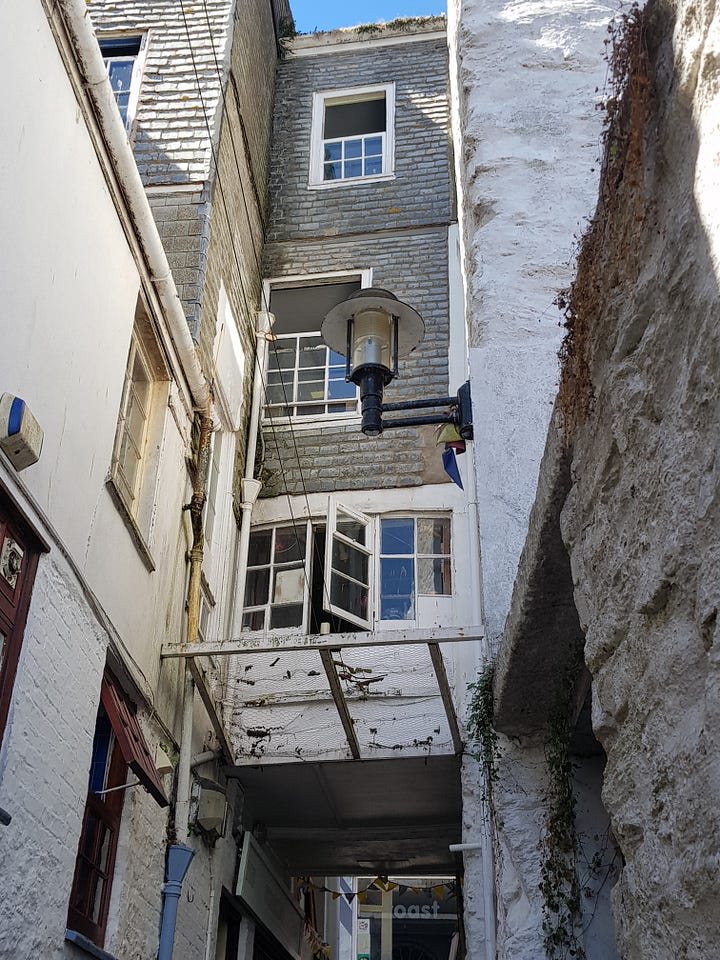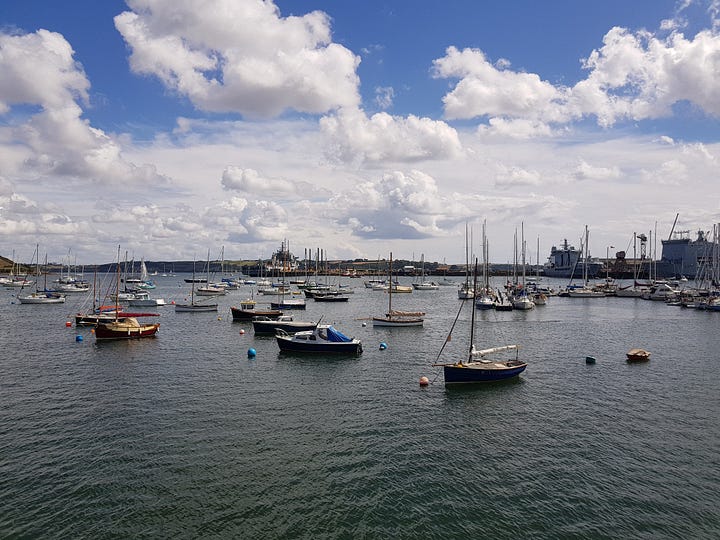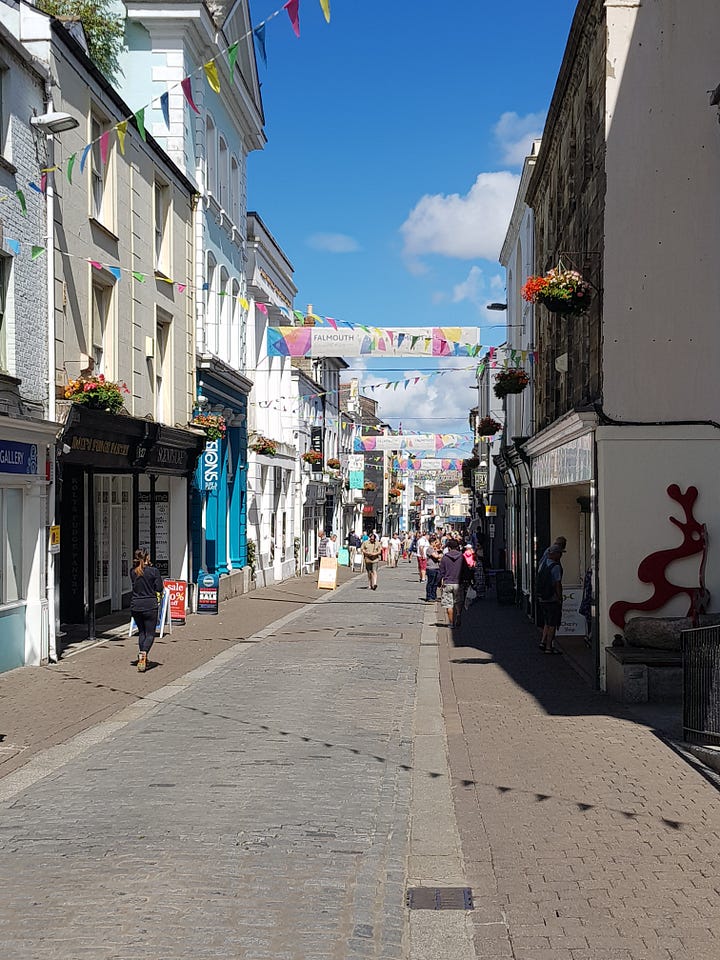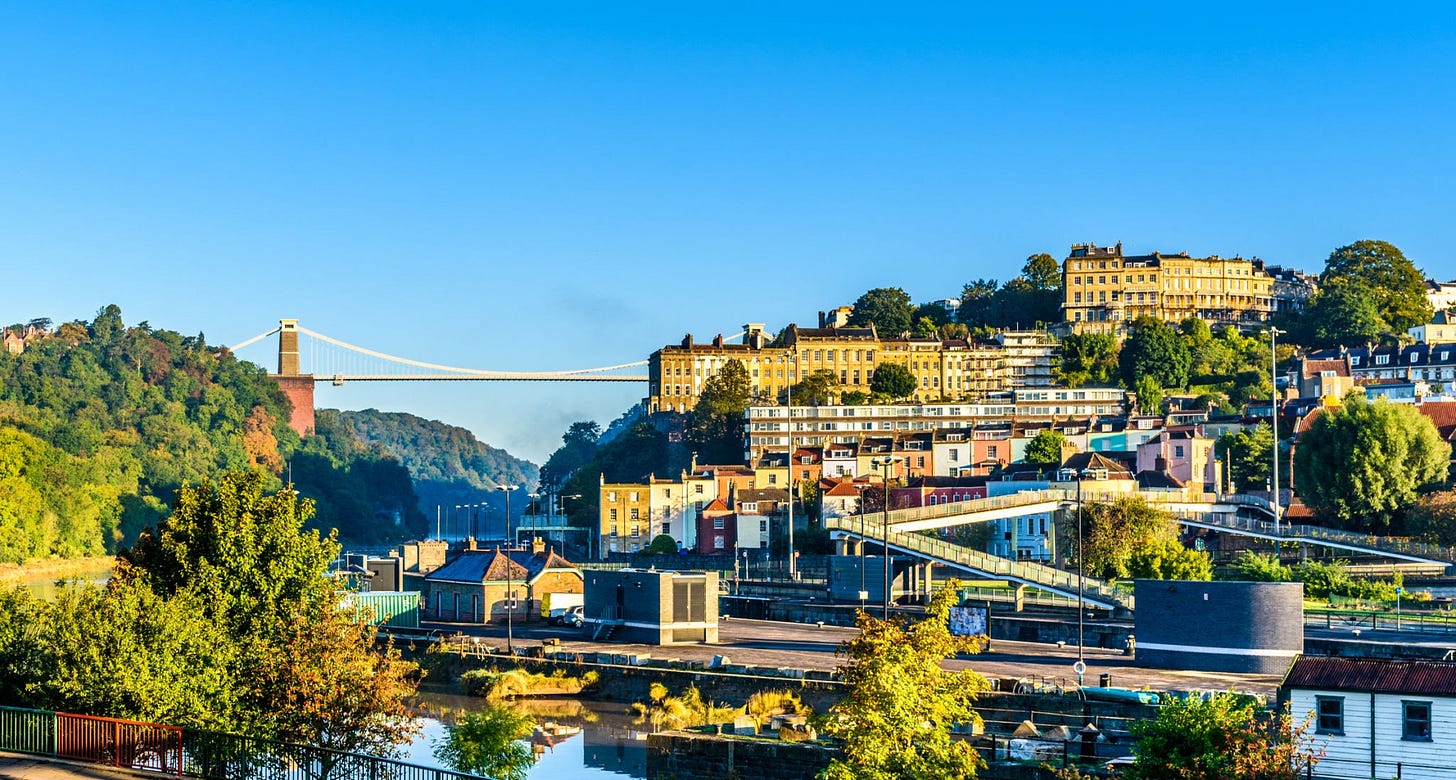I was around six years old when we relocated to Bristol. We went from a small rural town on the edge of Yorkshire to a city in the south west. Bristol is a place I am very fond of and throughout later life many of my jobs took me back there, even as recently as last year. It’s a university town with a long history and a cosmopolitan vibrant life.
Our first home was in a new town called Yate, to the north of the city and bordering on the old village of Chipping Sodbury. We lived in a two bedroom bungalow and dad worked in Bristol city centre for Watches of Switzerland. I can’t remember our address though I do remember the layout of the bungalow, with a kitchen and the main bedroom at the front,either side of the front door, a bedroom and living room at the rear. It was a much more modern property and the exterior walls were painted white, they may even have been pebble-dashed. I can’t remember the back garden, though there was quite a large front garden laid to grass. Memory tells me that our bungalow was the last in a row, next to some trees. Further down the road was a playground and beyond that were our schools. My sister attended the infant school adjacent to the junior school where I went and she later joined me. Mum became the school cook at the infant school. A working mum in the mid 1960s was rare, though I wasn’t particularly aware of that until later. There was something comforting in knowing that she was in a building across the playground. I recall her telling us that she was advised by her GP to get a job to help with her recovery from a breakdown, though I was far too young to understand what this was. I don’t know if she became unwell before or after the move south. What I do know is that she loved this bungalow.
We befriended the neighbours, a couple called Tony and Judy, and I would go round after school to help feed their baby after I’d done my handwriting practice; I had to copy a page from a Ladybird book every day. Mum would tease me about wanting a baby brother or sister and on one occasion dad told her to stop it because she knew this wasn’t possible. What dad said was incomprehensible to me, a child of 7. I now assume this was connected to the earlier still birth. Mum was plagued with gynaecological problems until her late 30s when an ovarian cyst burst and she had an emergency hysterectomy. She said that prior to her hysterectomy at the age of 37 she had 22 D&C’s for fibroids in the womb. The medics constantly refused surgery saying that she was too young and might want another child.
I’m not sure what happened to cause the end of a period of time that feels like it was idyllic. Dad may have lost his job? We moved into a rented flat above a shop in the centre of Yate. It wasn’t far from the bungalow, but seemed to be devastating in its impact. I guess I was about 8. I can’t remember much about the flat, other than it was very cold in winter. Dad had a tropical fish tank in the hallway near to the front door and one winter’s morning the fish had died. During this time mum got a job as a Secretary for a jewellers at the top end of Bristol. She would travel in with dad and I became responsible for looking after my sister. I can still remember us walking home in the pouring rain during a thunderstorm and seeking shelter under a large tree. The walk to school meant passing our old bungalow.
We didn’t stay long in the flat in Yate and around the age of 9 we moved again to Henleaze, to another flat which was above a print shop on a busy main road called Kellaway Avenue. We were getting closer to the city centre. Dad became self-employed and had a lock up shop a few doors down from where we lived. There was an ironmongers whose owners had a daughter we befriended called Jane. Further along was a greengrocers where two sisters lived where one afternoon running around their garden bare foot I stood on the ring pull of a Coke can which got stuck in my foot. Dad drove mum to work and me and my sister became what were known as ‘latchkey kids’. I was responsible for walking us both to and from school. Dad would be in his shop when we got home and we often went to play with Jane.
I really didn’t like this flat. I didn’t feel safe in this space. It was dark and dingy, there was no garden. The wall of the entrance hallway on the ground floor ran adjacent to the print shop, with stairs up that led to a landing. Walking along the hall you could hear the noise of the printing machines. There was a ledge which often had on it free small coloured pads of paper, off cuts from the printing machines, and I made a habit of collecting them. My love of stationery began at a young age. At the top of the stairs to the left was an exceptionally small kitchen with a bathroom off that. To the right was the hallway with the living room to the left and ahead was the bedroom I shared with my sister, overlooking the noisy main road, next to our parent’s bedroom. This flat was cramped and may have contributed to my desire for space and natural light as an adult.
At the rear was a bit of rough ground used for parking that was adjacent to a spiritualist church, which scared me with fears of ghosts. There were metal fire escapes at the back of some of the shops leading onto this empty land. One day my sister fell down one of them, it was quite a drop. She was often called clumsy, yet this incident led to a medical investigation at the Bristol eye hospital and she was found to have severe double vision which led to a sequence of eye operations, the thought of which make me shudder even now.
The two of us spent a lot of time playing on the large parade in front of the shops. We walked for miles, often pretending to be horses, or playing French skipping. Does anyone nowadays know what this is? It involved a narrow piece of elastic like that used in sewing, joined with a knot to form a continuous loop. Two people stood inside the elastic at opposite ends so that there was some tension, beginning with it at ankle height. The third person would stand in the middle and use their feet to create ever more complicated tangles which were released with a jump, landing with their feet either side of the elastic loop or jumping off. Hands were not allowed. If you got this wrong you then stepped into being one of the pair holding the tension. If you were error free the height of the elastic was adjusted up the legs and you had another go.
I became aware that money was scarce. The flat was very different to the bungalow or the house on Ashley Road. I sensed that Mum was deeply unhappy and things weren’t good between my parents. I remember mum running out of the flat one night and dad shouting after her at the top of the stairs. Somewhere in all of this she had her second breakdown. I remember staring out of the window into the dark at nighttime watching the car headlights go by, dreaming of living somewhere else. I became ‘difficult’, often refusing to go out on a Sunday afternoon to visit Tony and Judy, even the lure of playing with the baby didn’t draw me. Looking back on this now I realise that I was frightened and this was probably when I first developed what we would now call anxiety.
I was under pressure to do well at school. I’d been put up a class while at the school in Yate. I was a bookworm, escaping into a world of imagination, and had a very advanced reading age. Bristol had adopted comprehensive education to which mum was opposed, she wanted me to follow in her footsteps and attend a grammar school. I was put forward for the entrance exam to a private school called Redlands. I failed. Mum’s disappointment was acute, yet her determination to give me a good education didn’t flag. Eventually I was placed in a state Grammar school in the St Paul’s district of the city, which was a very deprived area. I felt overwhelmed by the burden of expectation and the sheer size of the school. I struggled with the adjustment and became increasingly withdrawn. Whilst home life remained unsettled and unhappy the transition from the junior school at Henleaze was too much. Dad would drop me off as part of the journey into the city centre to take mum to work. Traffic was terrible even then and the commute was often slow and tense with the fear of being late. Mum would voice her anger at the delays.
I stopped buying school dinners and used the money to buy sweets and Bazooka bubble gum at lunchtime, a ghastly bright pink colour, but I loved the sweet sugary taste. The school had a large playground which felt like a dangerous place to me. The toilets were outside in a block, cold and bleak, a place to exit as fast as possible. I felt lonely and afraid, a shy child struggling to make friends. There were no playing fields on site so we were bussed elsewhere to play hockey, where we got changed afterwards and forced to use communal showers which I hated. However, I was very amused that the school cook was called Mrs Gravy and the school nurse was called Mrs Stab - you couldn’t make it up!
One day I was called to the office of the deputy head, a spinster and a sparrow of a woman with a fearsome reputation who wore dark rimmed glasses and her hair in a bun. She was a scary figure and none of the children liked her, so being called to see her could only mean that I was in trouble.
She explained that mum had telephoned the school because she was concerned about me and had asked them to speak to me to find out what was wrong. I felt bewildered wondering why this total stranger was asking me awkward questions that I didn’t know how to answer. In retrospect I wonder whether the school rang mum to express their concern about me?
Not long after this event me and my sister were told that we were moving to Cornwall. I had no idea where we were going, other than it was a long journey and I felt the joy of leaving the flat. The relocation followed a period of time after mum got a job as the manager of a new jewellers called Dembo’s, located on Park Street. This was quite a coup for a woman with no experience of retail management let alone knowledge of high end jewellery. She’d been hosting jewellery parties selling stock from dad’s shop, earning extra cash, and being a natural salesperson she did very well. She caused a stir with the store opening of Dembo’s by having the staff wear hot pants, which got into the Bristol newspaper. By this time my sister and I would go ice skating on a Saturday afternoon, getting the bus to the top of Whiteladies Road, walk down it, past the university and on to Park Street, go to the rink and then walk back up the hill to Dembo’s and wait for dad to collect us. Nowadays I can’t imagine allowing my ten year old child to walk around a city like this, but life was different in 1970.
In May 1972 we relocated to Falmouth in Cornwall. It was the final term of school before the summer holidays. There was another new girl in my class and we formed a strong bond which lasted until our early 20s.
Mum had secured a job as the manager of a jewellers called Beringers. The owner, Mr Smith, had two other shops, one in Truro and another in Redruth. He was reopening the Falmouth shop which he had inherited from his uncle, Mr Beringer, whose brother was the founder of Beringer’s vineyard in California. Old Mr Beringer, as he was called, had died after a robbery. I always had visions of him being tied up in what became our living room in the flat above the shop. I’ve no idea if that were the case, but I lived there with the spectre of a man whom I was convinced had been murdered in what became our home.
This flat was a two storey home above the jewellers and at least twice the size of the one we left. It was on the main street in town, an old building in which Lord George Byron reputedly stayed thanks to an inscription etched on a tiny window of what became the office above Upton Slip which led to the harbour front. There was a ship’s head at the bottom of this alleyway, which is still there today.
Once again we were in a flat with a front door on to the main street with a hallway between the shop and the office with stairs at the rear going up to the first floor of a tiny kitchen that had an incredible view overlooking Falmouth harbour. There was a huge living room that ran parallel to the street. The second floor had a large bathroom to the rear and three bedrooms at the front, which meant that me and my sister had our own rooms.
I especially disliked my bedroom. There was a peculiar corner cupboard at the front that smelled very damp and musty with old wallpaper still visible; I kept the door to this firmly shut. This was another bedroom window from which I would lay my head on my arms at the base of the open sash window and watch the world go by at night, especially in the summer when the town was busy with sailors and tourists.
I lived there until I went to University in 1978. My parents bought a bungalow in Falmouth following the death of my maternal grandmother in 1980.
During a holiday in Cornwall in 2018 I went into the shop that replaced the jewellers. I said that I used to live in the flat above and the owner laughed and asked if I knew the combination to the safe which was still there. I remember the safe being delivered. It weighed a quarter of a ton and had a nine inch thick door. The actual locking part of the key to the safe was kept separate to the main barrel and the safe door could only be unlocked with the key after turning the dial to the entry code. Mum always said that future occupiers would never be able to remove the safe because of its weight.
The day we moved in was wet with Cornish mizzle, a very fine rain, a mix of mist and drizzle. The journey to the south-west took forever. In those days it was a five and a half hour drive from Bristol. The narrow road of Church Street was closed in order to give access to the removals van. There was initial hope and excitement, whilst everything felt very strange, moving from a city to a Cornish seaside town. Mum had got me a place at Truro Girls Grammar School while my sister went to the local junior school. My old school is now a Sainsbury supermarket and the all weather hockey pitch is the car park, which I found distressing when I first saw it back in 2010.
Truro was eleven miles away and dad drove me to school in the morning and I caught the train home. The school became my sanctuary. This was not a happy home. I became a very anxious and unhappy teenager, lost in my schoolwork, trying to deliver academic prowess as high marks seemed to be the only thing that made mum happy with me. The end of term school reports filled me with dread.
I never understood why we moved to Cornwall. It was in the same conversation with mum in which she told me why we left Worksop that she said the reason we left Bristol was because dad had another affair, this time with a woman from the hairdressers next to his shop. This explained her anger, her breakdown and depression while in Henleaze. She told me in the summer of 1981, when I returned home for temporary work before starting my first job after graduating from University. By then my sister and parents were living in the bungalow. I felt like a guest, sleeping on a fold out sofa bed. I always thought she told me out of spite, another conversation that seemed to come out of nowhere.
I was the first and only person in our family to go to University. It seemed to be a legitimate and acceptable way to leave home and to flee my mother. That summer of 1981 I knew I would never return home, I would do everything in my power to never go back.












Love hearing your stories! Life is full of beginnings and rebeginnings, again and again. Thank you for sharing :)
We spend so much time trying to understand our parents, long after they are gone. But it's our own life we are trying to decipher and heal. I enjoy the detailed account, looking for clues in the past to understand the present.